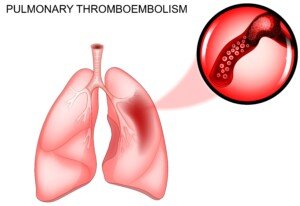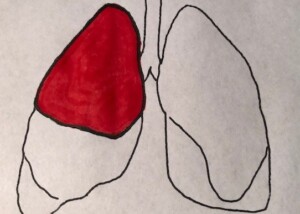There’s a unique circumstance under which a fainting episode may be caused by a pulmonary embolism.
A pulmonary embolism results when a deep vein thrombosis (“DVT” or blood clot) breaks loose and travels to the lungs.
Extended air travel can cause this problem.
A study concludes that if a person faints soon after air travel, this could signal a pulmonary embolism (PE).
However, fainting is generally not a common symptom of a pulmonary embolism.
But Fainting CAN Happen from a Pulmonary Embolism
“A pulmonary embolism cuts off blood flow to a portion of one or both lungs,” says Christopher J. Hanifin, PA-C, who was previously a physician assistant in open heart surgery with Cardiothoracic Surgery of South Bend in South Bend, IN.
“When a segment of lung loses its blood flow, it becomes unable to transfer the oxygen the body needs to survive.
“If the affected area is large enough, it’s possible that the patient will not be able to oxygenate the blood well enough to remain conscious.

Shutterstock/Artemida-psy
“If an embolism is large, another possible effect is a serious interruption of blood flow.
“A major blockage of a pulmonary artery can cause the amount of blood transiting the heart – the ‘cardiac output’ – to drop dramatically.
“In some cases the output of the heart may drop so low that consciousness cannot be maintained.”
Fainting Is More Suspicious for a Pulmonary Embolism if It Occurs Shortly After Air Travel
Research was presented at CHEST 2012, the annual meeting of the American College of Chest Physicians (ACCP).
Dr. Robert Rifenburg, MD, of Resurrection Medical Center in Chicago, and lead author of a study, said at the meeting, “Fainting may be an atypical symptom of PE, but fainting associated with recent air travel is a dangerous combination.”
PE that’s associated with recent air travel is also more likely to be the saddle type (blocking the pulmonary artery where it splits off into each lung), and this type is bigger and more life-threatening than other pulmonary emboli.
If you ever faint after recent air travel, get to an emergency room ASAP.
Dr. Rifenburg also said that a pulmonary embolism following a fainting episode after being in a plane very likely means that the situation is life-threatening.
The saddle type can cause sudden disruption of blood flow to the brain, which in turn causes fainting.
The study did not examine for an association between length of air travel and likelihood of fainting from a pulmonary embolism.
Nevertheless, Dr. Rifenburg speculates that a longer flight would put a person at a higher risk for a saddle embolism.


 Christopher J. Hanifin
Christopher J. Hanifin







































